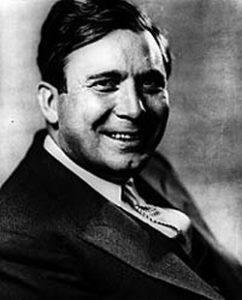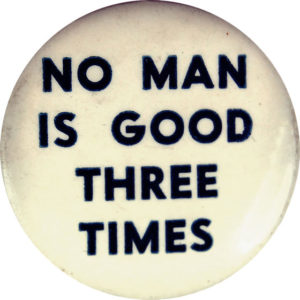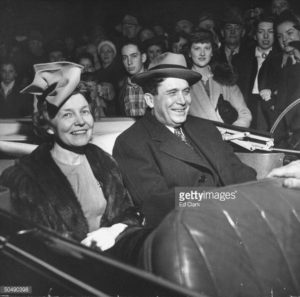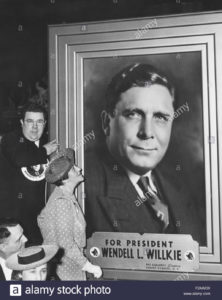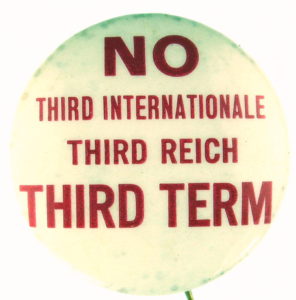Election 1940 Gallery
Questions For Election Day Debate Between FDR And Wendell Willkie, the Republican challenger 1940. Debate conducted on November 8, 2016 on Facebook, the publication day of alternative history thriller Dark Horse:
1) If Chancellor Adolf Hitler asked you as President of the United States would you send troops to help him invade Russia?
FDR: To join in such an invasion would mean the abandonment of this great country’s moral values.
We see today in stark reality some of the consequences of what we call the machine age.
Where control of machines has been retained in the hands of mankind as a whole, untold benefits have accrued to mankind. For mankind was then the master; and the machine was the servant.
But in this new system of force, of which Nazi Germany is the prime example, the mastery of the machine is not in the hands of mankind. It is in the control of infinitely small groups of individuals who rule without a single one of the democratic sanctions that we have known. The machine in hands of irresponsible conquerors becomes the master; mankind is not only the servant; it is the victim, too. Such mastery abandons with deliberate contempt all the moral values to which even this young country for more than three hundred years has been accustomed and dedicated.
Surely the new philosophy of force proves from month to month that it could have no possible conception of the way of life or the way of thought of a nation whose origins go back to Jamestown and Plymouth Rock.
This country could never join with and be a part of the new philosophy of Nazi Germany without abandoning its values, its very way of life and thought.
Willkie: I do not see us ever being allies with Hitler, even if Hitler proposed to invade Hell itself.
We have watched with horror the destruction of a free life within Germany and the ruthless invasion of other countries by Nazis. We make no pretense of friendliness to Nazi Germany nor to the objectives and goals of this ruthless dictatorship. We abhor everything that Hitler represents.
In simple terms, the United States stands for the right of an individual to lead a decent way of life. Hitler and his Nazis stand for the opposite.
Instead, we must face a brutal, perhaps, a terrible fact. Our way of life is in competition with Hitler’s way of life.
I promise, by returning to those same American principles that over-came German autocracy once before, both in business and in war, to out-distance Hitler in any contests he choses in 1940 or after. And I promise that when we beat him, we shall beat him on our own terms, in our own American way.
2) Would you give former British PM Winston Churchill asylum in the United States? How about the British Navy?
FDR: Both Winston Churchill’s government-in-exile and the British Navy should be given asylum here.
There are those who have maintained that it is improbable that Britain could ever recover its strength to fight and defeat the Axis powers. But it is a grotesque fallacy to say that a totalitarian system is efficient and therefore must conquer a democratic system which is necessarily inefficient, incompetent and obsolete.
There are some timid ones among us who say that we should not give any aid to Britain, that we must become accustomed to the rule of the totalitarian system in Europe, and that we must preserve peace at any price, lest we lose our liberties forever. To them I say this: . . . Our freedom has shown its ability to survive war, but our freedom would never survive surrender.
We have recently given 50 American destroyers to the British government-in-exile in exchange for military bases in the Western Hemisphere, leased rent-free for 99 years. If we fail to give haven to the British Navy, those American destroyers will fall into Nazi hands.
Willkie: Let us have Winston Churchill’s government-in-exile in the United States! Away with the Chamberlains, the Mosleys, and other Nazi appeasers and collaborators, and let us preserve democracy in the United States by seeking to restore it in Great Britain!
And the British Navy too! We must honestly face our relationship with Great Britain. We must admit that the loss of the British Fleet would greatly weaken our defense. This is because the British Fleet has for years controlled the Atlantic, leaving us free to concentrate in the Pacific. If the British Fleet were lost or captured, the Atlantic will be dominated by Germany, a power hostile to our way of life, controlling in that event most of the ships and shipbuilding facilities of Europe.
3) What would you do if Adolf Hitler offered you a trade deal with Nazi Germany that was too good to refuse?
FDR: I see great danger in accepting such a trade deal.
Perception of danger to our institutions may come slowly or it may come with a rush and a shock as it has to the people of the United States in the past few months. This perception of danger has come to us clearly and overwhelmingly; and we perceive the peril in a world-wide arena – an arena that may become so narrowed that only the Americas will retain the ancient faiths.
Some indeed still hold to the now somewhat obvious delusion that we of the United States can safely permit the United States to become a lone island, a lone island in a world dominated by the philosophy of force. And that we can choose to trade with the conquerors and the conquered.
Such an island may be the dream of those who still talk and vote as isolationists. Such an island represents to me and to the overwhelming majority of Americans today a helpless nightmare of a people without freedom – the nightmare of a people lodged in prison, handcuffed, hungry, and fed through the bars from day to day by the contemptuous, unpitying masters of other continents.
Willkie: I could never accept such a trade deal from Hitler.
In a typical American town or city, the quiet or busy streets, the pleasant parks and playgrounds, the people going casually about their business, seem far removed from the shattered cities, the gutted buildings, and the stricken people of Europe. It is hard for us to realize that the war in Europe can affect our daily lives. Instinctively we turn aside from the recurring conflicts over there, the diplomatic intrigue, the shifts of power that the last war failed to end.
Yet instinctively also―we know that we are not isolated from those suffering people. We live in the same world as they, and we are created in the same image. In all the democracies that have recently fallen, the people were living the same peaceful lives that we live. They had similar ideals of human freedom. Their methods of trade and exchange were similar to ours. Try as we will, we cannot brush the pitiless picture of their destruction from our vision, or escape the profound effects of it upon the world in which we live.
Trade is vital to our prosperity. But if we had to trade with a Europe dominated by the present German trade policies, we might have to change our methods to some totalitarian form. This is a prospect that any lover of democracy must view with consternation.
The objective of America is in the opposite direction. We must, in the long run, rebuild a world in which we can live and move and do business in the democratic way.
Hitler’s ideas of war and bloodshed don’t fit with our ideas of peace and commerce. The fruits of his labor are hate and death. The fruits of ours are happiness and life. He shall not enter here!
4) What do you think of the popular 1940 election pin: “No Third International Third Reich Third Term”?
FDR: No Third Reich. I like that. Hitler, of course, would have a different opinion.
Seriously, though, I would point to Mr. Willkie’s illuminating article in Look magazine, published in early June of this year. Mr. Willkie observed in that article that the founding fathers, and I quote, “knew, as we know” that the number of years the president serves “was of no importance. Had they made the president’s term two, six or 12 years, it would have made little difference.” Democracy stands or falls, Mr. Willkie further explained in that article, based on the, and again I quote “attitude” of the individuals who hold office “for whatever number of years.” Could it be that Mr. Willkie’s change of mind regarding the third term issue has something to do with the fact he was nominated at the Republican Convention later that month?
Willkie: We have a 160-year old tradition that no president served for more than two terms. This president already has strained democratic institutions to the breaking point, including his attempt in his second term to pack the Supreme Court. American voters should think hard before satisfying this third term candidate’s lust for power. If he is re-elected again, I predict that that by the end of his third term, Americans will be living under a totalitarian government.
5) Mr. President, do you think that running for a third term might set a dangerous precedent for the future?
FDR: Some would say that it would be more dangerous to change horses in mid-stream. Mr. Willkie is a newcomer to public office and inevitably it will take some time for him to adjust to being President. But can we afford such a period of adjustment at a time of crisis for the nation and the world?
Willkie: Well, for one thing, what are we doing in the middle of the stream. How did we get here? The man who got us in is not the right one to get us out!
And I dispute the notion that a man who has served eight years in the presidency is more experienced and better fit to lead than a newcomer. By that logic, you will come to the conclusion that Louis XIV, the worst despot in history, was the best ruler because he served the longest.
Surprise Question: Harry E. Homan, the cartoonist for the Brooklyn Citizen, has just drawn a cartoon showing a menacing figure of Hitler standing smack in the middle of the Republican Convention Hall in Philadelphia above the caption “The Uninvited Guest”. What do you think of this?
FDR: I for one do not question Mr. Willkie’s commitment to provide all aid, short of war, to Mr. Churchill’s government-in-exile so that democracy can be restored in Great Britain and so that Britain can then battle for democracy’s survival in Europe against Nazi tyranny.
But there are altogether too many people in high places in the Republican campaign who think in terms of appeasement of Hitler. I say to the isolationists, appeasers, defeatists, and fifth columnists, both within and without the Republican party, who repeatedly insist that the Axis powers are going to win anyway and we might as well get the best deal we can, I reject such a negotiated peace.
Is it a negotiated peace if a gang of outlaws surrounds your community and on threat of extermination makes you pay tribute to save your own skins? A nation can have peace with the Nazis only at the price of total surrender.
Willkie: Reckless and misguided isolationists are encouraging Americans to believe in the myth of the invincibility of dictatorships, of the invincibility of Hitler and his Nazi war machine, and in the delusion that Americans can find safety from the Nazi plague by locking ourselves within our own walls.
Americans must dedicate themselves not only to our national defense, but to the restoration of democracy to Britain. To restore Mr. Churchill’s government to Great Britain and to ensure a British victory against Nazi tyranny would be the greatest affirmation of democracy that the world has ever known.
In all those silent places on earth where men are enslaved and dictators now seem permanently in power there will be lifting of heads as there was more than a century ago when men first heard of the Declaration of Independence.
The world cannot get along without the United States of America. Americans, stop being afraid!
